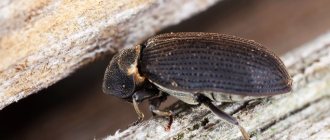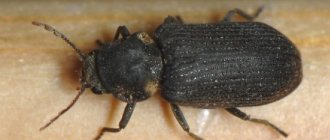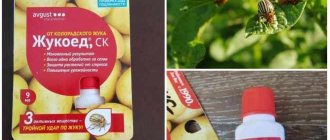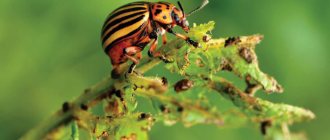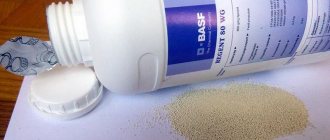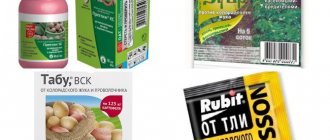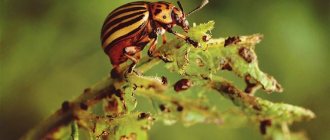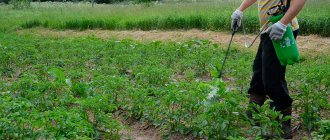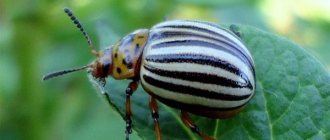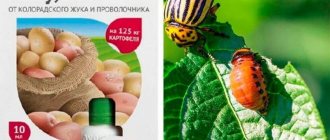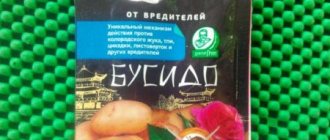Home » Garden and vegetable garden » Other » Pests
Olga Polyakova 06/01/2020
145350 Views
The Colorado potato beetle is capable of completely destroying most of the potato crop in days, and sometimes hours. And not only him. Being a natural “consumer” of nightshade crops, this insect is capable of infecting other plants in the absence of its main goal. Among them may be: tomatoes, physalis, eggplants, peppers. Let's look at the best remedies for the Colorado potato beetle.
Content
- 1. “Coragen Expert Garden” based on CHLORANTRANILIPROLE from the Colorado potato beetle
- 2. “Aktara” and others based on TIAMETHOXAM from the Colorado potato beetle
- 3. “Commander” / “Tanrek” / “Corado” / “Confidelin”, etc. based on IMIDACLOPRID from the Colorado potato beetle
- 4. “Stozhar, RP”
- 5. “Inta-Vir” / “Shar Pei” / “Alatar”, etc. based on CYPERMETHRIN
- 6. “Decis-Expert” based on DELTAMETHRIN from the Colorado potato beetle
- 7. “Aria” / “Monarch” / “Regent” based on FIPRONIL from the Colorado potato beetle
- 8. Inorganic insecticides for the Colorado potato beetle
- 9. Organophosphate insecticides for the Colorado potato beetle
- 10. “Zhukoed, SK” / “Zhukobor-Extra” / “Batraider, SK” - multicomponent preparations for the Colorado potato beetle
- As a conclusion
There are a huge number of drugs on the market in bright packaging and with sonorous names. How not to get lost in such diversity and choose effective remedies for the Colorado potato beetle.
To carry out quality processing, it is important to understand two main points:
- what potato treatments are carried out;
- what drugs are used at this or that stage.
So, in order. Potatoes will be treated with pesticides against pests at the following stages:
- before landing (pre-landing preparation);
- vegetative development;
- and before storing.
| MORE DETAILS: “Preparations for treating potatoes BEFORE PLANTING (list + recommendations for selection)” |
In this material we will consider preparations and their active ingredients for treating potatoes and other plants of the nightshade family against the Colorado potato beetle at the stage of VEGETATIVE development.
Effective products against the Colorado potato beetle for treating potatoes at the stage of vegetative development are made based on the following active ingredients:
- chlorantraniliprole (drug "Coragen");
- thiamethoxam (drugs "Aktara", "Kaiser", "Ephoria", etc.);
- imidacloprid (preparations “Confidelin”, “Tanrek”, “Commander”, “Zubr”, “Korado”, “Imidor”, “Konfidor”, “Iskra Zolotaya”, etc.);
- acetamiprid (drugs “Stozhar”, “Mospilan”);
- cypermethrin (preparations “Inta-vir”, “Cypermethrin”, “Kinmiks”, “Iskra-Double effect”, etc.);
- deltamethrin (preparations “Decis Expert”, “Atom”, “K-Obiol”, etc.);
- fipronil (drugs “Aria”, “Monarch”, “Regent”, etc.);
- organophosphorus compounds (OPCs) based on malathion (preparations “Karbofos”, “Alatar”, “Iskra-M”, “Aliot”, “Phenaxin”, “Fufanon-Nova/Expert”, etc.) or pirimifos-methyl (drug " Actellik") are currently not used or are rarely used against the Colorado potato beetle;
- aversectin (biological product “Fitoverm”, etc.), is currently not used against the Colorado potato beetle due to low efficiency;
- inorganic substances (for example, diatomite - the drug "Ecokiller", tobacco dust - the drug "Tabazol", etc.).
Drugs can be single-component (one active ingredient) or multi-component (two or more active ingredients).
| MORE DETAILS: “INSECTICIDES - summary table of drugs used (by composition/active substance)“ |
Features of pests and reasons for their appearance
The fight should begin by getting to know the enemy. Knowing the life cycle, vital functions and weak points of the insect, you can clear it from your summer cottage much faster and more efficiently.
The Colorado potato beetle gets its name from its origin. For the first time, a striped and so insatiable insect was recorded in the USA, Colorado, where it destroyed huge potato plantings. Then, with plants and fruits of vegetable crops, it spread far beyond the continent.
The pest belongs to the family of leaf beetles, has small sizes (up to 12 mm in length) and a characteristic bright color of the back with longitudinal alternating stripes of black and pale orange.
Insects have wings, thanks to which they quickly move over fairly long distances, “conquering” new areas of land.
Beetle larvae pose a particular danger because they are voracious and can destroy most of the crop in a short time.
The life cycle of Colorado potato beetles is quite simple:
- The fertilized female lays small, yellow or bright orange eggs on the underside of the leaves - 25-80 eggs per clutch (from 500 to 1000 pieces per season).
- The larvae hatch in about 5 days. They look like short, thick worms. The body is brown, salmon-pink or crimson with rows of black dots, the head is black. Over the next 15-22 days, the larvae feed and grow, undergoing periodic molts. Then they dive into the ground and experience the pupation stage, which lasts 20 days. The time spent in the larval and pupal stages is highly dependent on air and soil characteristics (temperature and humidity).
- The formed beetle crawls out or remains underground until spring.
When manually collecting beetles from plants, adults, caterpillars of different ages, and eggs are immediately removed from plants (usually the leaves on which clutches are found are simply torn off)
Insects feed on the soft part of the leaves, eating everything except the veins. They especially like potato tops, but they are also not averse to eating the foliage of tomatoes, eggplants, bell peppers and other crops belonging to the nightshade family.
Damage to green seedlings leads to almost one hundred percent loss of yield, so control should begin as early as possible. In this case, insects should be destroyed at all stages of development - eggs, larvae, adults.
Colorado beetles that have settled in a summer cottage can destroy not only the potato crop, but also threaten eggplants, tomatoes and other nightshades.
The Colorado potato beetle is especially dangerous for young plants. It quickly destroys their delicate foliage completely. Having noticed a parasite on plantings that are in the initial stages of the growing season, you need to take the most active measures to destroy it. Experienced gardeners try not to slacken efforts of this kind throughout the entire gardening season in order to prevent the proliferation of pests and prevent them from overwintering in the soil. This allows you to at least partially protect the crops that will be planted next year.
"Coragen Expert Garden" based on CHLORANTRANILIPROLE from the Colorado potato beetle
| “Coragen Expert Garden” is a new generation insecticide with high efficiency against the Colorado potato beetle, codling moth, leaf roller and other pests. This is a systemic insecticide with contact-intestinal action. The novelty of the mechanism of action is the removal of calcium from the insect’s body. Active ingredient – CHLORANTRANILIPROLE, dosage 200 g/l, chemical class – anthranilamides. Application rate – 1 ml/10 l. water. The duration of the protective effect is up to 3–4 weeks. Weather conditions do not reduce the effectiveness of the drug. More information about the drug "Coragen Expert Garden" |
Description
There are several dozen methods of combating the Colorado potato beetle, however, most of them are quite labor-intensive and ineffective.
Colorado beetle
The saddest thing is that the natural enemy of the beetle, the doryphora fly, was never able to leave Colorado , unlike its victim, which perfectly adapted to other climatic conditions.
Colorado potato beetle larvae
In addition, since the beetle accumulates solanine in its body, which is rich in the stems and leaves of many nightshades, it becomes inedible for most birds and reptiles. Of all the birds living in a temperate continental climate, only guinea fowl can eat beetles.
"Aktara" and others based on TIAMETHOXAM from the Colorado potato beetle
| "Aktara" is the strongest contact-intestinal insecticide of systemic action to control the population of a complex of sucking and leaf-gnawing pests, including the Colorado potato beetle. The active ingredient is THIAMETHOXAM. The drug "Aktara" is available in the form of a liquid concentrate (24% concentration) or water-soluble granules (25% concentration). This drug is one of the TOP 10 most used insecticides at present. As analogues, you can use the drugs “Instivo, KS”, “Insector, KS”, “Cruiser, KS”, “Kungfu Super, KS”, “Pantsir, KS”, “Kaiser, KS”, “Questor, KS”, “ Celest Max, KS”, “Celest Top, KS”, “Tiara, KS”, “Harita, KS”, “Eforia, KS”, etc., they contain the same active ingredient - thiamethoxam. There are no restrictions on compatibility with other pesticides and growth regulators. The period of protective action is up to 3 weeks. Doesn't wash off in the rain. Characterized by a high speed of initial impact. Among the disadvantages is resistance, so the number of treatments is 1 time, then insecticides from other chimeric classes should be used. More information about the drug "Aktara" |
“Commander” / “Tanrek” / “Corado” / “Confidelin”, etc. based on IMIDACLOPRID from the Colorado potato beetle
| This group of drugs is the most common. IMIDACLOPRID (chemical class - neonicotinoids) is most often used to control the population of the Colorado potato beetle and its larvae. It is a contact-intestinal pesticide with systemic action. In addition to the well-known drugs “Komandor, VRK”, “Tanrek, VRK”, “Korado, VRK”, the drugs “Confidelin VRK / VDG”, “Zubr, VRK”, “Imidor, KS/ VR”, “Iskra Zolotaya”, VRK/P, Tab", "Confidor Extra, VDG". The dosage of the active substance is from 20-70%. The most commonly used concentration is 20%, application rate is 1 ml/5 l. water / 100m2. The maximum dosage for the drugs “Commander Maxi, VDG” and “Confidor-Maxi/Extra” is 70%. These drugs are effective against a complex of common pests and have a high impact rate (100% result on the 3rd day). The mechanism of action of imidacloprid completely eliminates the manifestation of resistance (addiction). The effect of these drugs does not depend on the weather; they work even in the hottest weather. Disadvantage – the highest class of danger for bees. Imidacloprid-based insecticides for PRE-PLANTING treatment of potatoes are “Prestige, KS”, “Tabu/Tabu-TRIO”, “Klubneshiet”, “Commander + Energen”, etc. More about the drugs "Commander" ("Commander, VRK" / "Commander Maxi, VDG" / "Commander Plus") More about the drugs "Confidor" More about the drug "Confidelin" More about the drug "Iskra Zolotaya" |
"Stozhar, RP"
| “Stozhar, RP” is a systemic insecticide of contact-intestinal action based on synthetic nicotine - ACETAMIPRIDE. Mainly used in private household plots against the Colorado potato beetle and its larvae, as well as the codling moth. An important feature is that it is not only an insecticide, but also an ovicide (to kill the eggs of pests) and a larvicide (to kill the larvae of pests). Available in the form of a soluble powder, application rate is 8-10g/10l. water. The period of protective action is up to 3 weeks. The speed of action of the drug is 1-2 hours. As a rule, a single treatment is sufficient. As an analogue of the drug "Stozhar", you can use the drug "Mospilan, VRP, RP". More information about the drug "Stozhar" |
"Inta-Vir" / "Shar Pei" / "Alatar" etc. based on CYPERMETHRIN
| Cypermethrin and its isomers alpha-cypermethrin, beta-cypermethrin, gamma-cypermethrin (chemical class - pyrethroids) are widely used active substances to protect plants from the Colorado potato beetle and other insect pests. The active substance is used separately - as part of single preparations (for example, “Inta-Vir, Tab”, “Molniya Extra, CE”, “Cypermethrin, CE”, “Shar Pei, ME”, “Kinmiks, CE”, etc.), or in contains many component drugs (for example, “Alatar, CE”, “Iskra, SP/Tab”, etc.) A group of these drugs are contact-intestinal insecticides; they do not have a systemic effect, but remain for a long time on treated surfaces (up to 20-30 days) and are resistant to high temperatures and ultraviolet rays. As a rule, a 25% concentration of the active substance is used. Application rate 20-40 ml./10 l. water, single treatment. More about the drug "Cypermethrin" (25% Cypermethrin) More about the drug "Kinmiks, CE" (50% Beta-cipermetrin) |
Folk methods of struggle
Enterprising domestic summer residents are actively fighting the pest using simple homemade remedies. Some of them have little effect, others (especially with a small number of insects) are quite successful.
Recipes:
- Finely chopped wormwood is poured into a bucket and boiled water is poured to the top. Leave to infuse for 2-3 days, filter and spray the potato bushes;
- rub a piece of laundry soap, add 2 liters of sifted wood ash to the mixture. Fill with water (10 l), stir until the soap dissolves, then treat the plantings leaf by leaf;
- The dangerous pest is successfully fought with the help of calendula, marigolds, and dill. These plants are planted along the edges of potato beds, in rows. The smell of flowers and umbrellas repels insects from the crop (and not only from potatoes);
- sifted ash is poured into the soil around the potatoes;
- infuse aqueous mixtures and make decoctions with tobacco, hot pepper, leaves and stems of burdock, and chopped garlic. Spray the beds twice a week all season long;
To treat the tubers, they use potassium permanganate and copper sulfate, familiar to every gardener, and spray the plantings with a solution of boric acid with the obligatory addition of shavings of laundry soap (for better adhesion).
"Decis-Expert" based on DELTAMETHRIN from the Colorado potato beetle
| "Decis Expert/Profi" is a series of strong insecticides for rapid control of a wide range of insects - pests, including the Colorado potato beetle, and even locusts. DELTAMETHRINE (chemical class pyrethroids) is a strong nerve poison of intestinal contact action with long-term consequences. There is no antidote, therefore, for safe and effective treatments, the instructions for use must be strictly followed. Deltamethrin, like other pyrethroids, disrupts the functions of the nervous system; poisoning manifests itself in severe agitation and damage to motor centers. The period of protective action is up to 15 days. Systematic use of the drug is not allowed; it should be used only as an “ambulance” in emergency cases. Due to the strong lipophilicity of the drug, even rain does not affect the quality of processing. More information about Decis drugs |
Precautionary measures
Before using any of the chemicals, the farmer needs to protect himself: put on a protective suit, prepare rubber gloves, goggles, and a respirator. Do not dilute the working solution by eye. It is necessary to follow the dosage recommended in the description of the product (instructions).
For your information! Working solutions of insecticides should be prepared immediately before using chemicals.
It is prohibited to cultivate the beds 25 days before the start of the harvest period. Toxic substances included in insecticides are retained in the green mass of plants and tubers for up to two weeks.
"Aria"/"Monarch"/"Regent" based on FIPRONIL from the Colorado potato beetle
| FIPRONIL (chemical class phenylpyrazoles) is a contact and intestinal insecticide with a broad spectrum of action, has moderate systemic properties and good residual activity when treating plant leaves. Effective against insect pests from the orders Orthoptera and Coleoptera, including the Colorado potato beetle. Effective remedies for the Colorado potato beetle - “Aria, KS”, “Monarch, VDG”, “Regent, VDG” For example, the drug "Regent" is available in the form of water-dispersible granules ("Regent, VDG"), 80% concentration or con), concentration 25g/kg. It is characterized by a high rate of impact; in the first 3-5 hours after application of the drug, the pest’s feeding stops; within 24 hours, irreversible paralysis occurs. The period of protective action is 14 days. Application rate 5g/10l. water. More information about the drug "Regent" |
Inorganic insecticides for the Colorado potato beetle
For example, “Ecokiller” is a series of innovative preparations against insect pests. The line of drugs includes separately “Ecokiller for Colorado potato beetles”. The basis of the drug is DIATOMITE (diatomite powder), which has abrasive and absorbent characteristics. Its tiny particles attach to the surface of the insect and absorb lipids (fats) from the outer chitinous layer of the shell. As a result, the protective film that retains water is destroyed, and insects (adults, nymphs, larvae) die from dehydration.
Development cycle
The pest loves to feast on potatoes at any stage of its development. As soon as the potato tops emerge from the ground, bugs emerge from the ground along with them and immediately begin to feed on the seedlings and mate. If the females managed to mate in the fall, then in the spring they begin to lay eggs on the underside of young leaves. In one day, the female can lay up to 80 light orange eggs, from which larvae hatch in 5-17 days at favorable temperatures. Over the summer, the female is capable of laying up to 700 eggs.
The larvae have 4 instars, separated by molts.
- At the 1st instar, the larvae gnaw out the lower pulp of the leaf;
- In the 2nd, they gnaw out all the pulp of the leaf, leaving thick veins.
Larvae of these instars can be seen in colonies on the tops of potato shoots. Already with further development (3rd and 4th instar), the larvae scatter and move to neighboring plants. Intensively eating foliage, after 2-3 weeks they burrow into the ground to a depth of 10 cm for pupation. After 2-3 weeks, the resulting pupa crawls to the surface, where they continue further development, unless, with the onset of autumn, they enter diapause until next spring.
To overwinter, beetles go into the soil to a depth of 30-50 cm, where they are not afraid of any methods of combating them.

